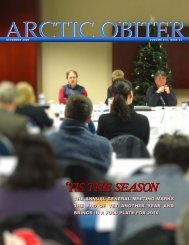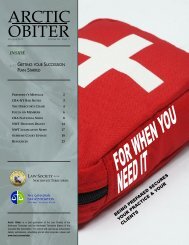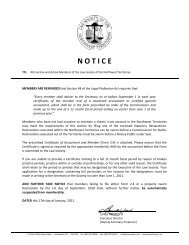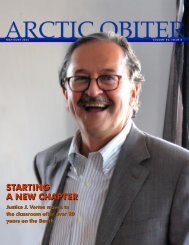ARCTIC OBITER
September/October 2011 - Law Society of the Northwest Territories
September/October 2011 - Law Society of the Northwest Territories
- No tags were found...
You also want an ePaper? Increase the reach of your titles
YUMPU automatically turns print PDFs into web optimized ePapers that Google loves.
SEPTEMBER/OCTOBER 2011 | 15<br />
RJR – MacDonald Inc. v Canada (Attorney General),<br />
[1994] 1 SCR 311<br />
Frontenac Ventures Corporation v Ardoch Algonquin<br />
First Nation, [2008] OJ No 792 (QL) (SCJ)<br />
ABORIGINAL LAW – ABORIGINAL<br />
CUSTOM ADOPTION RECOGNITION<br />
ACT – APPLICATION OF<br />
CUSTOMARY LAW<br />
Bruha v Bruha<br />
2011 NWTSC 44 (CanLII) | September 12, 2011<br />
Presiding: Justice V. Schuler<br />
The Applicant: No appearance<br />
The Respondent: Bruha, assisted by T. Caisse<br />
Child was living with adoptive parents<br />
under the Aboriginal Custom Adoption<br />
Recognition Act. The natural father had<br />
been paying child support to the natural<br />
mother.<br />
Adoptive father applied for<br />
and obtained an order that the child<br />
support be paid to him.<br />
Court<br />
subsequently set aside that order on the<br />
basis that no evidence had been<br />
presented about the customary law as it<br />
relates to a biological parent’s<br />
obligation to pay child support<br />
notwithstanding the custom adoption.<br />
Adoptive father’s application for child<br />
support adjourned sine die, for evidence<br />
on that issue.<br />
CASES CITED<br />
Kalaserk v Strickland (unreported), SCNWT<br />
docket no. CV08090, August 11, 1999<br />
CRIMINAL LAW – SENTENCING –<br />
SEXUAL ASSAULT – SENTENCING<br />
PRINCIPLES – RESENTENCING<br />
AFTER A RETRIAL<br />
R v Gargan<br />
2011 NWTSC 47 (CanLII) | September 16, 2011<br />
Presiding: Justice L. Charbonneau<br />
For the Crown: G. Boyd<br />
For the Defendant: C. Wawzonek<br />
Offender convicted after a second trial<br />
for sexual assault. At his first trial, the<br />
offender had been convicted and<br />
sentenced to four years’ imprisonment.<br />
An appeal against conviction led to the<br />
retrial. The circumstances of the offence<br />
as shown in the evidence at the first trial<br />
were not different from that shown by<br />
the evidence in the second trial. The<br />
principle of parity applies to sentencing<br />
on a retrial, although any change in the<br />
offender’s personal circumstances since<br />
the time of the original sentencing may<br />
be taken into account. Any difference<br />
between the sentence on the original<br />
trial and the sentence on the retrial must<br />
be clearly justified and anchored on<br />
solid reasons.<br />
The paramount sentencing principles in<br />
cases of sexual assault on a sleeping<br />
victim are denunciation and deterrence.<br />
Consideration of the offender’s<br />
aboriginal heritage cannot result in a<br />
reduction of what would otherwise be<br />
an appropriate sentence for this crime.<br />
The four year sentence originally<br />
imposed was fit. Sentence reduced by<br />
21 months for time served following the<br />
first trial and before the appeal was<br />
allowed, and by a further six months for<br />
pretrial custody pending the retrial.<br />
The rehabilitative efforts taken by the<br />
offender in the period between the first<br />
and second sentencing were important,<br />
but did not make a material difference<br />
for this sentencing as there were both<br />
positive and negative factors to<br />
consider.<br />
CASES CITED<br />
R v Mathieu, 2008 SCC 21<br />
R v Fice, 2005 SCC 32<br />
EMPLOYMENT LAW –<br />
EMPLOYMENT STANDARDS ACT –<br />
METHOD OF CALCULATING<br />
OVERTIME RATE<br />
Medic North v Harnish<br />
2011 NWTSC 46 (CanLII) | September 20, 2011<br />
Presiding: Justice L. Charbonneau<br />
For the Applicant: P. Smith<br />
For the Respondent: S. McCardy<br />
The Respondent was an employee of<br />
Medic North. He filed a complaint with<br />
the Employment Standards Office and<br />
the Office ordered Medic North to pay<br />
the employee outstanding wages,<br />
overtime pay, statutory holiday pay and<br />
termination pay in lieu of notice. Medic<br />
North appealed the overtime award to<br />
an adjudicator, and the adjudicator<br />
dismissed the appeal.<br />
Medic North<br />
appealed to the Supreme Court on the<br />
narrow issue of the rate used by the<br />
adjudicator in calculating the overtime<br />
amount.<br />
Appeal dismissed – The applicable<br />
standard of review is reasonableness.<br />
The Employment Standards Act provides<br />
that overtime pay is calculated on the<br />
basis of 1.5 times the employee’s regular<br />
rate of pay, or where the employee’s<br />
wages are not computed and paid<br />
solely on the basis of time, then 1.5<br />
times the minimum wage.<br />
The<br />
adjudicator determined the employee’s<br />
regular rate of pay based on the pay<br />
stubs issued by the employer which<br />
made reference to an hourly rate.<br />
Although the employment contract did<br />
not refer to an hourly rate and the<br />
employee’s pay did not vary with the<br />
number of hours worked, the employee<br />
had been granted lieu days from time to<br />
time, in compensation for overtime<br />
worked. It was not unreasonable for the<br />
adjudicator to have relied on
















